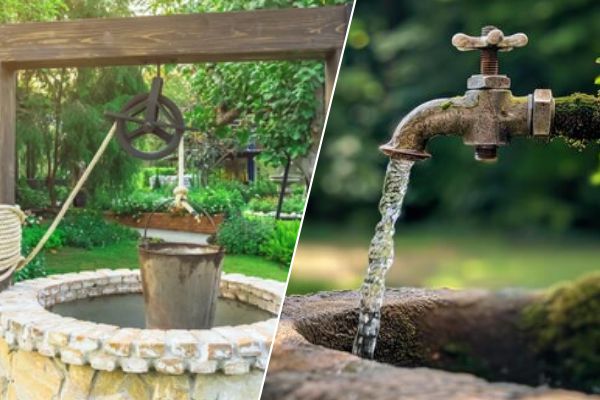
When you are looking for a new home, one of the many decisions you will face is whether you will have to choose between a property with healthy water, but you are stuck on which water is good for you and your family. This might seem like a small thing, but it can have a huge impact on your daily life. So, let’s understand the main differences between Tap water and Well water in simple terms, so that you can make a decision.
What Actually Well Water Means?
Well water means the water that comes from an underground source called a groundwater.
Here’s how it works:
- Source: A well is drilled into the ground to access water stored in aquifers beneath the earth.
- Pumping: The water is pumped up from the ground and brought into your home.
- Natural Filtration: As water passes through ground and rock, some impurities are naturally filtered out, but the effectiveness of this process depends on the depth and location of the well.
Benefits of Well Water:
- Natural: Even today, many people love its natural taste and the fact that it has undergone minimal treatment.
- Cost: After the initial setup, you might have lower ongoing costs compared to city water.
Possible Drawbacks:
- Maintenance: You need to regularly test and maintain your well to secure water quality.
- Taste: Well water can have a unique taste or smell, like sulphur or iron.
- Contamination Risk: If not properly maintained, well water can be contaminated by nearby activities.
What is Tap Water?
Tap water comes from a public water system managed by your city or town. This water is treated and filtered before it reaches your home.
This is how it works:
- Source: Tap water usually starts from lakes, rivers, or reservoirs.
- Treatment: The water goes through various treatments to remove dirt, bacteria, and chemicals. This includes filtering, adding chemicals to kill germs, and sometimes adding other substances to make the water taste better. At some places it may be given or provides as mineral water.
- Distribution: Once cleaned, the water is sent through pipes to homes and businesses.
Benefits of Tap Water:
- Regulated: Tap water is regularly tested and treated to meet strict safety standards.
- Convenience: You get it straight from the tap with no need for extra equipment.
- Cost -Effective: Usually, you pay for water through your utility bill.
Possible Drawbacks:
- Taste: Some people also notice other tastes, such as chlorine or iron.
- Cost: Tap water can cost more depending on where you live.
Key Differences Between Tap Water and Well Water
Source & Treatment
- Tap Water: It comes from lakes, rivers, or reservoirs and undergoes treatment at a water plant to eliminate impurities.
- Well Water: It comes from underground sources and undergoes natural filtration, although additional treatment may be necessary.
Quality & Safety
- Tap Water: Generally, it is very safe, due to regular testing and treatment. Though, problems can arise from outdated infrastructure.
- Well Water: It’s quality can vary. You should test the water regularly for bacteria, chemicals, and other impurities.
Taste & Odor
- Tap Water: Many have a chlorine taste or smell as a result of the treatment process.
- Well Water: May have a distinct taste & smell, as a sulphur or metal, depending on the minerals it contains.
Cost & Maintenance
- Tap Water: Lower maintenance for homeowners, costs are included in your utility bill.
- Well Water: Necessary more maintenance, which includes regular testing and potential repairs. The initial setup costs can be expensive.
Environmental Impact
- Tap Water: Managed by the city or town with efforts to conserve resources and reduce pollution.
- Well Water: Usually has a smaller environmental impact but requires careful management to prevent the depletion of local groundwater.
Factors to consider while taking the decision
Your lifestyle:
- Tap Water: Ideal if you prefer low maintenance and a consistent supply.
- Well Water: Good if you like natural water and are willing to invest in maintenance.
Health and Safety:
- Tap Water: Reliable and regulated, but additional filtration might be desired for taste or health reasons.
- Well Water: Requires regular testing to ensure it’s safe to drink.
Cost:
- Tap water: Generally, lower ongoing costs.
- Well water: Higher initial cost, but potential savings in the long run.
Conclusion
Both tap water and well water have their pros and cons. Tap water offers convenience and regulatory safety, while well water provides a natural source of hydration. Understanding these differences can help you make the right choice for your new home. If you choose well water, remember that regular testing and maintenance are key to ensuring clean, safe water.
No matter what type of water you end up with, having the right information helps you make the best choice for your home and health. Cheers to making an informed decision and enjoying great water every day!
